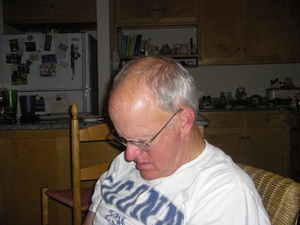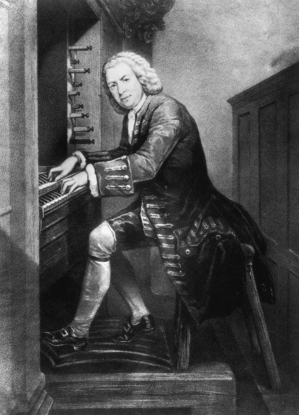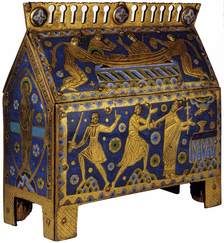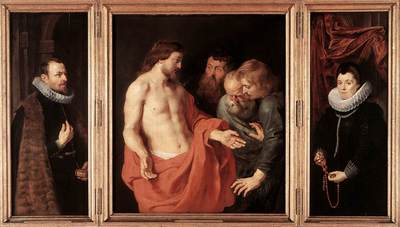Paul Zalonski: July 2009 Archives
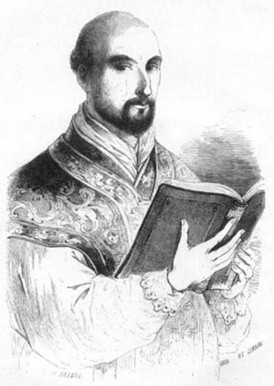 Whoever does not bear his own cross and come after me, cannot be my disciple.
Whoever does not bear his own cross and come after me, cannot be my disciple.
Earlier today I was speaking with my friend, Father Meinrad Miller, a Benedictine monk of Saint Benedict's Abbey (Atchison, KS) and he told me he wrote this article for the local Catholic diocesan newspaper on his experience with the movement we both closely follow, Communion and Liberation. What Father Meinrad says in his article is applicable to all of us. It's reprinted here for education of us all. Let me know what you think of it.
Seven years ago this fall an event happened here at Benedictine College that would change my life. My college roommate, B.J. Adamson, had told me over the years about a Catholic movement he had discovered back in Denver: Communion and Liberation (CL). B.J. would often tell me about the method of the movement's dynamic founder, Monsignor Luigi Giussani (October 15, 1922-February 22, 2005), and of a friend of the movement here in the United States Monsignor Lorenzo Albacete. Cardinal Stafford, then the Archbishop of Denver, had spoken highly of CL.
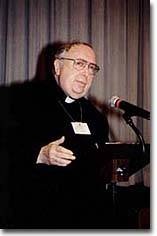
In September 2002 we hosted a presentation here at Benedictine College on one of Giussani's key books, The Religious Sense. The presentation included talks by Monsignor Lorenzo Albacete, a physicist, theologian and good personal friend of Pope John Paul II; Major David Jones, an army officer who had been attracted to the Catholic faith after watching a show on EWTN with Raymond Arroyo in which Monsignor Albacete was interviewed about Monsignor Giussani; Dr. Eduardo Echeverria, currently a philosopher at Sacred Heart Seminary in Detroit; and Mike Eppler, the Youth Minister for the Evansville, Indiana Diocese.
What appealed to me about this first presentation was that everything said that evening deepened my own appreciation of being a Benedictine monk. Giussani's method affirms that the encounter with Christ is possible to all people. Over the coming years we would have further book presentations here at the college on the writings of Monsignor Giussani. Each time I would grow in my fascination for the message of Christ as relevant and part of life today. It was only later that I learned that St. Benedict was the patron saint of the movement. At one time Monsignor Giussani had written to some Benedictine monks near Milan, Italy. In part he said: Christ present! The Christian announcement is that God became one of us and is present here, and gathers us together into one body, and through this unity, His presence is made perceivable. This is the heart of the Benedictine message of the earliest times. Well, this also defines the entire message of our Movement.
Perhaps Monsignor Giussani's fascination with St. Benedict began as a young seminarian for the Archdiocese of Milan. The Archbishop during Monsignor Giussani's seminary training was Blessed Ildephonse Schuster, O.S.B., the saintly Benedictine. The same year that Blessed Ildephonse Schuster died, 1954, would mark a major change in the life of Giussani as well.
While riding on a train for vacation in 1954, Giussani noticed from the conversation of the youth on the train that there was little interest in Christianity. Much of the discussion focused on the ideologies of the day, including Marxism. Giussani asked the new Archbishop's permission to leave his work as a seminary professor and begin to teach high school students.
The conversion on the train reminded me of Blessed Mother Teresa's own conversion. This past year I gave a seminar to the Missionaries of Charity in Washington, D.C. As I was reading about Blessed Mother Teresa I could not help but notice a similarity with Monsignor Giussani. Mother Teresa was also on a train on September 10, 1946, going for her yearly retreat in the mountains of India. It was on the train that she had a mystical experience in which she would experience the great thirst God has for souls. Not just for water but for men and women to experience the real thirst of God's love for them.
Eight years after Blessed Mother Teresa's experience on the train in 1946, Monsignor Giussani would have his experience on the train in 1954. Years later he would also reveal the depth of this conviction when, in front of Pope John Paul II and hundreds of thousands of people gathered at St. Peter's square on Pentecost Sunday, 1998, he would say: Existence expresses itself, as ultimate ideal, in begging. The real protagonist of history is the beggar: Christ who begs for man's heart, and man's heart that begs for Christ.
Whether one looks at our humanity in terms of Christ thirsting for us in the words of Blessed Mother Teresa, or Christ begging for man's heart, in the words of Monsignor Giussani, the same dynamic is present. Christ desires us to encounter Him as a present reality, not just a distant myth.
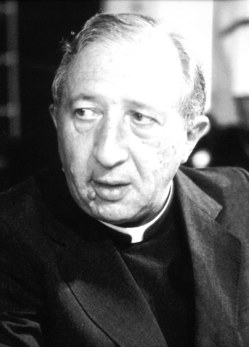
On September 10, 2004, Cardinal Ratzinger, the future Pope Benedict XVI, would describe his own meeting with Monsignor Giussani in the early 1970s, and Communion and Liberation:
It was an interesting discovery for me; I had never heard of this group (Communion and Liberation) until that moment, and I saw young people full of fervor for the faith, quite far from a sclerotic and weary Catholicism, and without the mentality of "protest"-which considers all that was there before the Council as totally superseded-but a faith that was fresh, profound, open and with the joy of being believers, of having found Jesus Christ and His Church. There, I understood that there was a new start, there was really a renewed faith that opens doors to the future.
This same experience is relived today by groups in the region in Kansas City, Benedictine College, KU, and Wichita that meet weekly to follow the method of Monsignor Luigi Giussani.
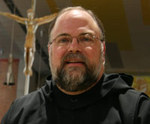
Father Meinrad Miller, O.S.B. is the Subprior of Saint Benedict's Abbey, and Chaplain of Benedictine College in Atchison, KS
This article was recently published in The Catholic key, the Catholic newspaper of the Diocese of Kansas City-St Joseph, MO.
In some places it's now catching-on that Thursday is a
fitting day for Eucharistic adoration with the intention of reparation, perhaps
replacing Fridays if one had to make a choice or either-or. I tend to think
that Thursday is a more apt for Eucharistic adoration on a stable basis in one's
life and perhaps in parish life since as Catholics our center is Eucharistic and
the identification the Church makes with events that happened on Holy Thursdays
and Corpus Christi. Some theologians and spiritual writers today are advocating
this move for just this reason: Do this in memory of me. Whatever the case is,
adoration of the Blessed Sacrament is clearly a return to "the Cenacle, there
to relive in adoration and joy the gift and mystery of the Most Holy
Eucharist."
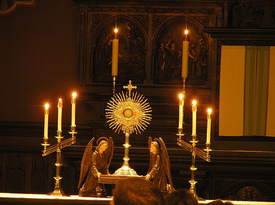
Thinking about what Pope Benedict XVI has said regarding the Lord's Supper, "the Church commemorates the institution of the Eucharist, the ministerial priesthood and the new commandment of charity, left by Jesus to his disciples." In another place he said that there is a "...renewed invitation to render thanks to God for the supreme gift of the Eucharist, to be received with devotion and to be adored with lively faith. Because of this, the Church encourages, after the celebration of Holy Mass, watching in the presence of the Most Holy Sacrament, recalling the sad hour that Jesus passed in solitude and prayer in Gethsemane, before being arrested and then being condemned to death." We therefore adore Jesus in the Blessed Sacrament, either following Mass or at another time to live in the graces of what happened at Mass. Adoration of the Blessed Sacrament extends the graces of the Mass even after Mass has ended.
What better day than to work on this invitation to live in a spirit of renewal with the Eucharist, the ministerial priesthood and the theology of the Mass. The gift of sanctification (holiness) promised us by the Lord is made real in the bond we have with the Eucharistic Lord. Our lives depend on it because a strong Eucharistic spirituality centers our heart in the heart of the Church.
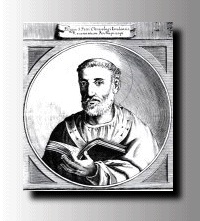 The Lord led the just in right paths, and showed him the kingdom of God.
The Lord led the just in right paths, and showed him the kingdom of God.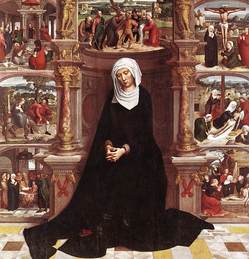
Since last year I've been thinking of the role spiritual mothers, in the example of Our Lady, play in the lives of Catholic priests. I am thinking in particular of Our Lady of Sorrows for this type of spiritual maternity. In the past I mentioned this idea here and here at the beginning of 2009 (perhaps I should do it more). The call to be a priest's spiritual mother includes a woman's offering herself to God, praying in intercession and reparation for the priest, spending time in Eucharistic Adoration and becoming a point for God's grace to work in the life of a priest. A woman of any age can do this work of intercession; she can be single, married, or widowed. This spiritual work is hidden and contemplative, sacrificial and silent. It is in this special work that the reparation for the sins of priests might happen for as the Holy Father said, "nothing makes the Church, the Body of Christ, suffer more than the sins of her pastors."
My interest has been sparked by two people, Franciscan Cardinal Claudio Hummes and Benedictine Father Mark Kirby, the latter drawing on
Adoration & Spiritual Maternity.pdf to ask the Divine Majesty to renew priesthood through a special devotion to the Eucharist. But there's been other work done by people such as Catherine Dougherty, Mother Marie des Douleurs and Maria Sieler as well as the countless laity and consecrated men and women of the Church.In October 2008 Tulsa, OK, Bishop Edward Slattery started a process of formation for women to dedicate their prayer for the needs of the priesthood. I am told that there are some women in the Bridgeport Diocese that there are women who dedicate their lives as a spiritual mother for priests but they are so hidden no one knows them. Something has to be done in the manner in which Bishop Slattery is doing this holy work!
More recently Jane, living in France, has begun some work and prayer on spiritual maternity for priests. Her blog, Spiritual Mothers of Priests, is a good personal initiative to assist priests (and I presume seminarians) with prayer and sacrifice during this Year of the Priest. Ladies, visit and follow the work of Jane and join other women to this special work for priests.

The Meeting for Friendship Among the Peoples is about start in Rimini, Italy. Since 1980 there has been a meeting of friends and interested peoples gathered together to understand the various points of contact in knowledge, faith, culture and human experience. There's been an average of 700,000 people attending this week long event. The Rimini Meeting is influenced by the thought of the founder of Communion and Liberation, Msgr. Luigi Giussani.
The cultural and interreligious dialogue at the 2009 Rimini Meeting will be happening 23-29 August 2009. The theme for this year's meeting is "Knowledge is Always an Event."
Watch the video clip on the diplomats' preview of the meeting.
The Crossroad Cultural Center did a Washington, DC presentation on this year's Meeting. See the transcript of the event.
Various pieces of info on the work of the meeting:
+ The Rimini Meeting: 30 years of dialogue
+ The exhibitions at the meeting
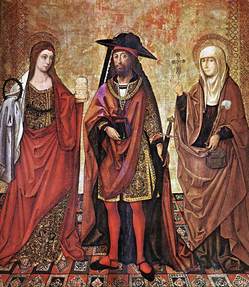 Heavenly Father, your son was received as an honored
and welcome guest in the home of Bethany. Keep us close to the Master in our
prayer and work that, blameless in his sight, he may welcome us into our
eternal home, who lives and reigns with you and the Holy Spirit, one God, for
ever and ever.
Heavenly Father, your son was received as an honored
and welcome guest in the home of Bethany. Keep us close to the Master in our
prayer and work that, blameless in his sight, he may welcome us into our
eternal home, who lives and reigns with you and the Holy Spirit, one God, for
ever and ever.
Never a day goes by that I don't ask the question about my faith and my life of faith. I doubt any serious Christian would go through life without asking the same: How does my faith impact my relationship with God and vice verse? Do I live in certain intimacy with the divine nature? Do others see God in me as I relate to them? How credible a witness am I of Jesus Christ and His Good News?
Without faith it is impossible to please God. (Hebrews 11:6). Faith is the foundation of our relations with God. For the man without faith, God has no meaning, no value, no place in his life. On the contrary, the more lively our faith is, the more God enters into our life, until finally he becomes our all, the one great reality for; which we live, and the One for whom we courageously face sorrow and death. If we live, we live to the Lord, and if we die, we die to the Lord (Romans 14:8). Those who dedicate themselves to the spiritual life do not lack faith; but often our faith is not alive and concrete enough to make us always see God in everything, which would give us the sense of his fundamental, transcendent and eternal reality that infinitely surpasses all earthly realities. In practice we do not reflect sufficiently on the truth that to be a believer is a pure gift of God, not due to any personal merit. God is both the object of faith and the giver of faith; it is he who infuses into us the desire to know him and to believe in him and who makes us capable of the act of believing.
Divine Intimacy, Father Gabriel of St. Mary Magdalen, OCD
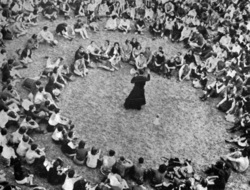 My first thought goes -- it's obvious -- to your
founder Monsignor Luigi Giussani, to whom many memories tie me, since he had
become a true friend to me. Our last meeting, as Father Carrón mentioned, took
place in Milan Cathedral two years ago, when our beloved Pope John Paul II sent
me to preside at his solemn funeral.
My first thought goes -- it's obvious -- to your
founder Monsignor Luigi Giussani, to whom many memories tie me, since he had
become a true friend to me. Our last meeting, as Father Carrón mentioned, took
place in Milan Cathedral two years ago, when our beloved Pope John Paul II sent
me to preside at his solemn funeral. 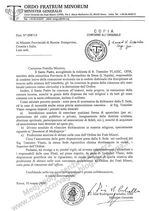 A CNA article today announces the priest who identified the alleged apparitions of the BVM is now leaving the priesthood and his religious order. The authorized his defrocking in March. Also disturbing are the reports that some of the seers are living in wealthy conditions, presumably derived from monies given by pilgrims. See the brief Mail Online article. The Telegraph tells more...
A CNA article today announces the priest who identified the alleged apparitions of the BVM is now leaving the priesthood and his religious order. The authorized his defrocking in March. Also disturbing are the reports that some of the seers are living in wealthy conditions, presumably derived from monies given by pilgrims. See the brief Mail Online article. The Telegraph tells more...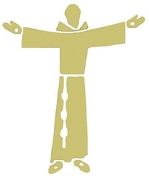 The Capuchins in Italy are taking time to reflect on
the greatest God-given gift they've received: work of 100 years among the native Brasilian
peoples. What really struck me was the Provincial's comment: "And we truly lived it as
a gift: participating in His mission, that is to say, the mission of Jesus
Christ."
The Capuchins in Italy are taking time to reflect on
the greatest God-given gift they've received: work of 100 years among the native Brasilian
peoples. What really struck me was the Provincial's comment: "And we truly lived it as
a gift: participating in His mission, that is to say, the mission of Jesus
Christ." 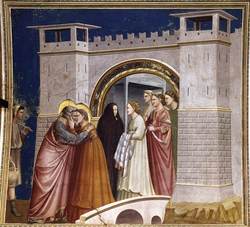
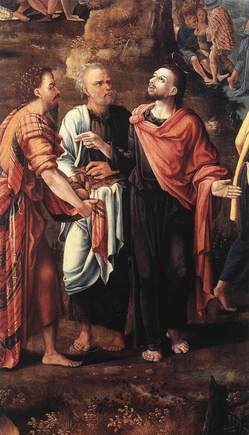
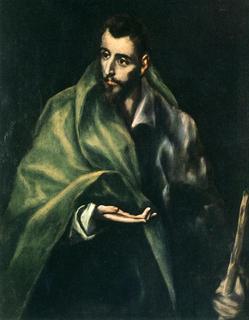
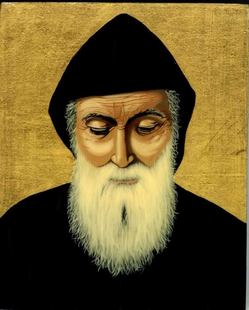
Every one who has left houses or brothers or sisters or father or mother or children or lands, for my name's sake, will receive a hundredfold, and inherit eternal life.
God our Father in Saint Sharbel Makhluf, You gave a light to Your faithful people. You made him a pastor of the Church to feed Your sheep with his word and to teach them by his example. Help us by his prayers to keep the faith he taught and follow the way of life he showed us.
Saint Sharbel Makhlouf (1828-1898) was
born in a small Lebanese mountain village who became, at 23 years old, a monk
of the Lebanese Maronite Order and later ordained a priest in 1859. He is known
for his intense devotion to lectio divina, the Eucharist and the Blessed Virgin
Mary. Sensing a deeper call in 1875, he began a solitary life (as a hermit) which
he lived for twenty-three years of his life. Sharbel's witness taught us
about the virtues of poverty, self-sacrifice, and prayer in world dominated by
an attraction to money, power and fame. Since July 24, 2004 Saint Sharbel has
been introduced the liturgical observance in the sacred Liturgy.
Archbishop Francis M. Zayek said of Saint Sharbel:
"Reading about the holy hermits of the desert, we used to consider many reported facts as mere fables. In the life of Blessed Sharbel, however, we notice that these facts are authentic and true. Blessed Sharbel is another Saint Anthony of the Desert, or Saint Pachomius, or Saint Paul the Anchorite. It is marvelous to observe how you, Maronites, have preserved the same spirituality of the fathers of the desert throughout the centuries, and at the end of the nineteenth century, 1500 years later, produced a Sharbel for the Church."
(The icon was painted by iconographer Christine Habib el Dayé. Other pieces of the artist's work can be seen here and she can also be found on Facebook.)
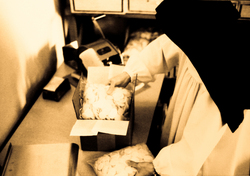 Recently, the National Catholic Register published an
article on the life of nuns at the Valley of Our Lady Monastery, located on 112
acres in Prairie du Sac, outside of Madison, Wisconsin. The author brings out
some salient points that contribute to the "success" of this particular
monastery. Let's be clear, success is not defined here in terms of secularity but ways that allow for a vocation to thrive according to the Divine
Plan. Let me draw your attention to two things that struck me. Mind you, these
items (see below) are not new at all but they do spell out what is needed to help contribute to
the resurgence of religious life if it's God's will. Sadly groups like the Sisters of Mercy, the Sisters of St Joseph, the various Franciscan and Dominican sisters' congregations to name a few, would think these comments are inaccurate, too shrill and not relevant for the "modern world." Truthfully, I think these groups want to die because they are too "relevant" matter. BUT when you see women attracted to congregations like this monastery, the Alma Mercy Sisters and the Franciscan Sisters of the Martyr Saint George and not to the secular-looking groups, then one has to ask the hard questions. Having defend the general thesis of the article, let it be known I am not totally in
agreement with Father Mullady's acceptance of BlackBerries but I can't have
everything.
Recently, the National Catholic Register published an
article on the life of nuns at the Valley of Our Lady Monastery, located on 112
acres in Prairie du Sac, outside of Madison, Wisconsin. The author brings out
some salient points that contribute to the "success" of this particular
monastery. Let's be clear, success is not defined here in terms of secularity but ways that allow for a vocation to thrive according to the Divine
Plan. Let me draw your attention to two things that struck me. Mind you, these
items (see below) are not new at all but they do spell out what is needed to help contribute to
the resurgence of religious life if it's God's will. Sadly groups like the Sisters of Mercy, the Sisters of St Joseph, the various Franciscan and Dominican sisters' congregations to name a few, would think these comments are inaccurate, too shrill and not relevant for the "modern world." Truthfully, I think these groups want to die because they are too "relevant" matter. BUT when you see women attracted to congregations like this monastery, the Alma Mercy Sisters and the Franciscan Sisters of the Martyr Saint George and not to the secular-looking groups, then one has to ask the hard questions. Having defend the general thesis of the article, let it be known I am not totally in
agreement with Father Mullady's acceptance of BlackBerries but I can't have
everything.
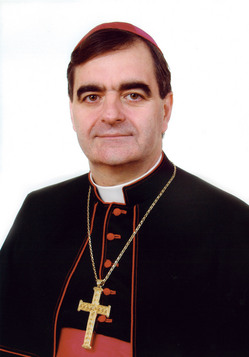
His Excellency, the Most Reverend Nikola Eterovic, Secretary General of the Synod of Bishops, Vatican City State, will deliver a talk titled "Pope Benedict XVI, the Bible and the Synod of Bishops."
The archbishop will review the seminal work of the of the world-wide gathering of bishops and other experts on the Word of God which happened in October 2008.
The talk is sponsored by the American Bible Society and is being presented at their NY Offices.
Details:
Date: Tuesday, July 28, 2009
Time: 6:30-7:30 p.m.
Location: The American Bible Society
1865 Broadway (between 61st & 62nd Streets) New York, NY 10023
RSVP Alicia DeFrange at 212-408-1260 or by emai adefrange@americanbible.org
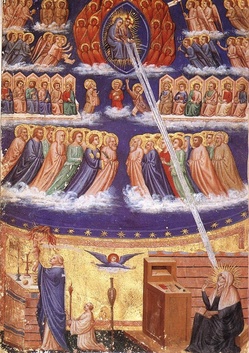 Lord, our God, you revealed the secrets of heaven to Saint Bridget as she meditated on your Son's Passion. Grant that we your servants may find great joy when your glory is revealed.
Lord, our God, you revealed the secrets of heaven to Saint Bridget as she meditated on your Son's Passion. Grant that we your servants may find great joy when your glory is revealed.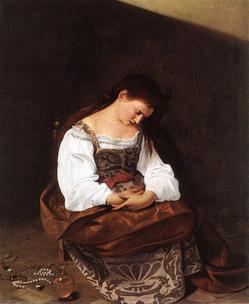 Early in the morning of the first day of the week, when Jesus had arisen, he first appeared to Mary Magdalene, from whom he had driven seven devils.
Early in the morning of the first day of the week, when Jesus had arisen, he first appeared to Mary Magdalene, from whom he had driven seven devils. We're in the middle of the annual Vacation Bible School. About 150 kids ranging in ages 4-11 are attending the week. Each day a member of the clergy (or the seminarian) gives an explanation of the day's Scripture passage who then ends the 5 minute lesson with a prayer. Well...
We're in the middle of the annual Vacation Bible School. About 150 kids ranging in ages 4-11 are attending the week. Each day a member of the clergy (or the seminarian) gives an explanation of the day's Scripture passage who then ends the 5 minute lesson with a prayer. Well... Today is the 236th anniversary of the promulgation of Dominus ac Redemptor, the papal bull of Pope Clement XIV (a Conventual Franciscan) suppressing the Society of Jesus (the Jesuits). In this bull the pope dissolved the Society without condemning it because it is said that he did revere many of its members. Hence, the suppression had nothing to do with enmity (Franciscans vs. Jesuits) as much as it had to do with the significant criticism the Society faced and the likely realization of the threat of Church schism if the pope didn't do something with the Jesuits. Faced with the pressure of a fragmented Church, Clement did what he had to do. By the time of this unusual papal intervention, the Jesuits were expelled from Brasil, Portugal, France, Spain and Parma.
Today is the 236th anniversary of the promulgation of Dominus ac Redemptor, the papal bull of Pope Clement XIV (a Conventual Franciscan) suppressing the Society of Jesus (the Jesuits). In this bull the pope dissolved the Society without condemning it because it is said that he did revere many of its members. Hence, the suppression had nothing to do with enmity (Franciscans vs. Jesuits) as much as it had to do with the significant criticism the Society faced and the likely realization of the threat of Church schism if the pope didn't do something with the Jesuits. Faced with the pressure of a fragmented Church, Clement did what he had to do. By the time of this unusual papal intervention, the Jesuits were expelled from Brasil, Portugal, France, Spain and Parma.
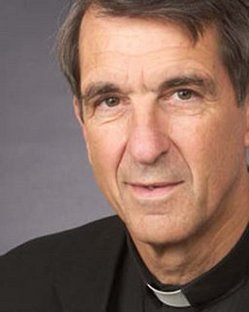 As it's reported in a few places, Jesuit Father Joseph Fessio, the well-known and gifted teacher and leader was fired by Ave Maria University. The matter of his dismissal revolves around all things, financial matters of the university. Something mentioned here before. So, one must ask if the university is going to be able to make it in the long haul or is the pizza man's dream over. All are called upon to pray for the Holy Spirit's guidance for Father Fessio and, of course, for Ave Maria who once again makes an imprudent decision just because someone disagrees with their philosophy. Sounds like the roundheads are at it again. Read the news article on this event. Father Fessio's email follows:
As it's reported in a few places, Jesuit Father Joseph Fessio, the well-known and gifted teacher and leader was fired by Ave Maria University. The matter of his dismissal revolves around all things, financial matters of the university. Something mentioned here before. So, one must ask if the university is going to be able to make it in the long haul or is the pizza man's dream over. All are called upon to pray for the Holy Spirit's guidance for Father Fessio and, of course, for Ave Maria who once again makes an imprudent decision just because someone disagrees with their philosophy. Sounds like the roundheads are at it again. Read the news article on this event. Father Fessio's email follows:How often do you hear that Catholics don't read the bible? How often do you think (or say) that you aren't a bible thumper? Do you know bible basics? Do you have a bible in your home? Do you know where to find a bible in your Catholic church? I'd be willing to bet that you can't even find a copy of the bible in the church. Just today a college student asked me if there was a bible in the church and I had to admit that I wasn't sure if we had one available. Ironically, today began the parish's Vacation Bible School with a 140 little kids so the question of how we use the bible is in the forefront of our minds. Mary Elizabeth Sperry compiled a Catholic's approach to the bible-praying-reading-study-meditation.
The Bible is all around us. People hear Scripture readings in church. We have Good Samaritan (Luke 10) laws, welcome home the Prodigal Son (Luke 15), and look for the Promised Land (Exodus 3, Hebrews 11). Some biblical passages have become popular maxims, such as "Do unto others as you would have them do unto you (Matthew 7:12)," "Thou shalt not steal (Exodus 20:15), and "love thy neighbor" (Matthew 22:39).
Today's Catholic is called to take an intelligent, spiritual approach to the bible.
Listed here are 10 points for fruitful Scripture reading.
- Bible reading is for Catholics. The Church encourages Catholics to make reading the Bible part of their daily prayer lives. Reading these inspired words, people grow deeper in their relationship with God and come to understand their place in the community God has called them to in himself.
- Prayer is the beginning and the end. Reading the Bible is not like reading a novel or a history book. It should begin with a prayer asking the Holy Spirit to open our hearts and minds to the Word of God. Scripture reading should end with a prayer that this Word will bear fruit in our lives, helping us to become holier and more faithful people.
- Get the whole story! When selecting a Bible, look for a Catholic edition. A Catholic edition will include the Church's complete list of sacred books along with introductions and notes for understanding the text. A Catholic edition will have an imprimatur notice on the back of the title page. An imprimatur indicates that the book is free of errors in Catholic doctrine.
- The Bible isn't a book. It's a library. The Bible is a collection of 73 books written over the course of many centuries. The books include royal history, prophecy, poetry, challenging letters to struggling new faith communities, and believers' accounts of the preaching and passion of Jesus. Knowing the genre of the book you are reading will help you understand the literary tools the author is using and the meaning the author is trying to convey.
- Know what the Bible is - and what it isn't. The Bible is the story of God's relationship with the people he has called to himself. It is not intended to be read as history text, a science book, or a political manifesto. In the Bible, God teaches us the truths that we need for the sake of our salvation.
- The sum is greater than the parts. Read the Bible in context. What happens before and after - even in other books - helps us to understand the true meaning of the text.
- The Old relates to the New. The Old Testament and the New Testament shed light on each other. While we read the Old Testament in light of the death and resurrection of Jesus, it has its own value as well. Together, these testaments help us to understand God's plan for human beings.
- You do not read alone. By reading and reflecting on Sacred Scripture, Catholics join those faithful men and women who have taken God's Word to heart and put it into practice in their lives. We read the Bible within the tradition of the Church to benefit from the holiness and wisdom of all the faithful.
- What is God saying to me? The Bible is not addressed only to long-dead people in a faraway land. It is addressed to each of us in our own unique situations. When we read, we need to understand what the text says and how the faithful have understood its meaning in the past. In light of this understanding, we then ask: What is God saying to me?
- Reading isn't enough. If Scripture remains just words on a page, our work is not done. We need to meditate on the message and put it into action in our lives. Only then can the word be "living and effective."(Hebrews 4:12).
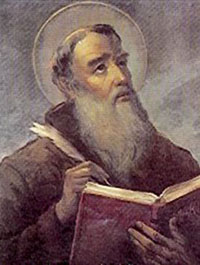
In 1961, Saint Lawrence joined three other Franciscans friars as a
Doctor of the Church (Saints Anthony & Bonaventure and Blessed John Duns
Scotus) though he is the only Capuchin to have this distinction. He is known as the Doctor Apostolicus (the Apostolic Doctor).
Saint Lawrence's brief biography is found here.
New to me is this Litany of Saint Lawrence of Brindisi.
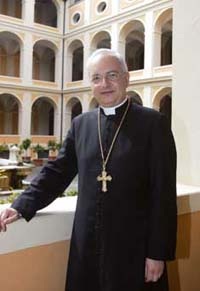
"Are you resolved, with the help of the Holy Spirit, to discharge without fail the office of the priesthood in the presbyteral order as a conscientious fellow worker with the Bishop in caring for the Lord's flock?"
The Archbishop-Secretary of the Congregation for the Clergy, Mauro Piacenza, wrote to the world's priests on July 15th reflecting on the liturgical theology that identifies and supports the theology of priesthood. Now that we are clearly in the Year of the Priest we have to make solid effort at connecting our daily prayer for priests (and, those preparing for ordination) and education on what the Church believes and teaches about the priesthood. This year dedicated to the priesthood is not only directed to renewal and reform of the priesthood but also conversion of the entire Church. The year of priestly renewal is not merely centered on prayer for the local priest (which is most essential) but also a time for some intellectual formation for both priest and people. So, the proposal of the Pope is that we give a sufficient attention to both prayer and education, not one or the other. I'd like to note that I find myself disappointed to see the lack of a public of storming heaven for the graces of renewal but also the lack of sufficient discussion of what the Church teaches and believes. What to do? In the meantime, Archbishop Piacenza offers a number of juicy tidbits to consider. He said in part:
The
Church, in her maternal wisdom, has always taught that the ministry is born of
the encounter of two freedoms: divine and human. If on the one hand one must
always recall that, "no one claims this office for himself; he is called to it
by God" (CCC n.1578), on the other hand, clearly, it is always a "human and
created I", with his own story and identity, with his own qualities and also
his own limitations, who responds to the divine call.
The
liturgical-sacramental translation of this asymmetric and necessary dialogue
between the divine freedom which calls and the human freedom which responds is
represented by the questions which each of us has had addressed to him by the
Bishop during the rite our own ordination, immediately prior to the imposition
of hands. We shall revisit together in the months ahead this "dialogue of love
and freedom".
We
have been asked, "Are you resolved, with the help of the Holy Spirit, to
discharge without fail the office of the priesthood in the presbyteral order as
a conscientious fellow worker with the Bishop in caring for the Lord's flock?"
We answered, "I Am"
The
free and conscious response is based, therefore, on an explicit act of the will
("Are you resolved to discharge the office", "I am") which, as we know well,
requires to be continuously enlightened by the judgement of reason and
sustained by freedom, so as not to become a sterile voluntarism or, worse, to
change over time, becoming unfaithful. The act of the will is enduring of its
very nature, because it is a human act, in which the fundamental qualities of
which the Creator has made us participants are expressed.
The
undertaking, then, that we have assumed is "for the whole of life" and thus not
related to fads or indulgences much less to sentiments, which might be apparent
to a greater or less degree. While feelings may be said to have a role in
coming to the knowledge of the truth, it is only so as to direct out focus in
such a way as not to obstruct such knowledge but to assist the discernment of
it. Nevertheless, this is but one aspect of consciousness and cannot be its
determining factor.
Our
will has accepted to exercise "the priestly ministry", not other "professions"!
Above all else we are called to be priests always and, as the Saints remind us,
in every circumstance, exercising with our very being that ministry to which we
have been called. One does not merely act as a priest: one is a priest!
Each
one of us is part of a dynamic entity, called to collaborate by demonstrating,
each in his own way, the Head of this Body: always as "fellow workers with the
Bishop", in obedience to the good which he indicates, and "under the guidance
of the Holy Spirit", that is in praying with each breath. Only he who prays can
hear the voice of the Spirit. As the Holy Father recalled in the General
Audience of the 1st July last, "Those who pray are not afraid; those who pray
are never alone; those who pray are saved!".
An angel in the flesh, the foundation of the prophets, and the second forerunner of Christ, the glorious Elijah from on high sent grace to Elisha, to cure sicknesses & cleanse lepers. He likewise overflows with healing for those who honor him.
(Troparion of the feast, Tone 4)
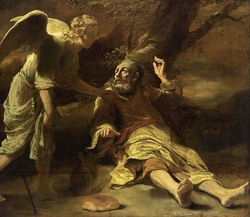
Let all Christ's Church assemble here
And, gathered in His holy Name,
Keep solemn, joyful festival
To sing of great Elijah's fame.
Of all the prophets who foretold
God's hidden plan of saving grace,
He is the chief: to him we give,
The Tishbite, now the choicest place.
He called the folk of Israel
Back to their covenant with God;
Through kingly wrath and violence
God's narrow way of truth he trod.
When earthly tasks for him were done,
You called him in a special way:
A fiery chariot came for him,
Foretelling Christ's ascension day.
For all the graces You have giv'n
Through what Elijah did for You,
Your Church on earth gives endless praise,
O Father, Son, and Spirit true.
L.M. (88.88)
James Michael Thompson (2009)
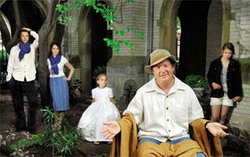 Interesting people come from the Elm City! The New Haven native who's also a Catholic priest, Father Andrew O'Connor, of the Archdiocese of New York, designs clothes, provides jobs in two countries and continues to preach the Gospel.
Interesting people come from the Elm City! The New Haven native who's also a Catholic priest, Father Andrew O'Connor, of the Archdiocese of New York, designs clothes, provides jobs in two countries and continues to preach the Gospel.
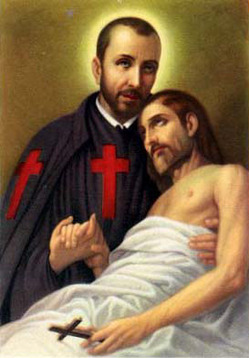
As the Father has loved me, so have I loved you; abide in my love. If you keep my commandments, you will abide in my love, just as I have kept my Father's commandments and abide in his love. These things I have spoken to you, that my joy may be in you, and that your joy may be full.
Father, you
gave Saint Camillus a special love for the sick. Through his prayers inspire us
with your grace, so that by serving you in our brothers and sisters we may come
safely to you at the end of our lives.
A bio on Saint Camillus
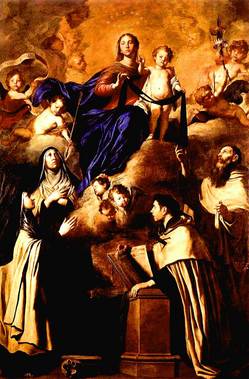 In communion with Our Lady of Mount Carmel help us,
dear Lord, to arrive at last at the mountain which is Christ who lives and
reigns with you in the unity of the Holy Spirit.
In communion with Our Lady of Mount Carmel help us,
dear Lord, to arrive at last at the mountain which is Christ who lives and
reigns with you in the unity of the Holy Spirit.
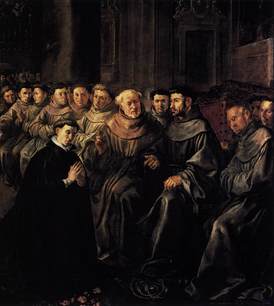 O God, Who did give Thy people blessed Bonaventure as a minister of eternal salvation, we beseech Thee; grant that we may deserve to have him as an intercessor in heaven, whom we had as a teacher of life on earth.
O God, Who did give Thy people blessed Bonaventure as a minister of eternal salvation, we beseech Thee; grant that we may deserve to have him as an intercessor in heaven, whom we had as a teacher of life on earth.The healing wasn't enough for John to enter the Franciscan order. A man of considerable talent and brilliance, the desire to study led him to the University of Paris where as a layman he completed his Master of Arts by the age of 22. He was regarded as an expert and a popular lecturer in logic and rhetoric. The Franciscans indicate that he enter the fraternity in either 1238 or 1243.
By 1256 Bonaventure's university life was anxiety provoking when lay professors started violently opposing their religious counterparts. In 1257 and not yet 36 years old, Bonaventure was elected minister general of the Franciscans. He was known to keep the unity and direction for the friars at a time that the order was experiencing unrest. Both Saints Bonaventure and Thomas Aquinas were given their doctoral degrees from the University of Paris on 23 October 1257.
The saint served the Church as bishop of Albano and as a cardinal.
Bonaventure died in 1274 while participating in the Council of Lyon; he was invited to the council by Pope Gregory X.
As a scholar and thinker with a sterling character, Saint Bonaventure was known to intercede for others before God and richly blessed by God leading others to say that he had escaped original sin. He left the Church a rich written legacy intellectual works and an incredible constellation of high profile students. His The Life of Saint Francis, Commentary on the Sentences of Lombard, Commentary on the Gospel of Saint Luke, and Itinerarium Mentis ad Deum, Breviloquium are his significant works.
Bonaventure was canonized by Pope Sixtus IV and
named a Doctor of the Church by Pope Sixtus V.
Saint Thomas Aquinas asked Saint Bonaventure about the source of his teaching; Bonaventure responded, "I study only the crucified on, Jesus Christ." And so should we.
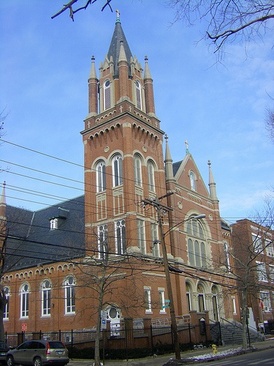
Archbishop Henry J. Mansell, Archbishop of Hartford, in a letter to the Saint Gregory Society of New Haven, Connecticut, gave his permission for the Traditional Latin Mass community to relocate from Sacred Heart Church in New Haven to Saint Stanislaus Church at 9 Eld Street in New Haven.
"He wants to be certain the church is appropriate for your needs," wrote the archbishop.
He gave permission for the first Traditional Latin Mass at Saint Stanislaus in New Haven to be on The Feast of the Holy Cross, September 13, 2009. The Mass according to the 1962 Roman Missal will be celebrated at 2 pm at Saint Stanislaus just as it had been celebrated at 2 PM at Sacred Heart.
In his cordial letter of introduction, Archbishop Mansell encouraged cordial relations with the pastor, Father Roman Kmiec, C.M., pastor of Saint Stanislaus. Father Kmiec has indeed warmly welcomed the Saint Gregory Society.
Archbishop Mansell said he was "glad to help" the Saint Gregory Society in finding a new home for the Community.
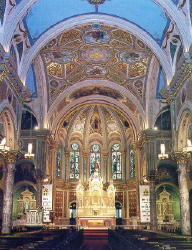
Saint Stanislaus Church is staffed by the Congregation of the Mission (the Vincentians) of the New England Province. The Vincentians, an congregation of priests and brothers founded by Saint Vincent de Paul in the 1600s, spread the gospel message of Jesus in championing the needs of the poor.
The De Paul Provincial House is located at 234 Keeney Street in Manchester, CT.
I am happy to receive this news. I spent nine years of my formative years at Saint Stan's with the Vincentians and the Congregation of the Holy Family of Nazareth. Saint Stan's is New Haven's best looking church maintaining the original artwork and liturgical furnishings.
The Saint Gregory Society of New Haven is a non-profit lay association founded in 1985 to promote the local celebration of the Traditional Latin Liturgy according to the Tridentine Missal in response to the Papal indult of October 3, 1984, Quattuor abhinc annos, which granted the use of the liturgical books in force in 1962.
Since January 1986, the Traditional Latin Mass regularly has been celebrated at the Sacred Heart Church in downtown New Haven. The Saint Gregory Society exists primarily to advocate the preservation of the immemorial rite of the Mass, to work for its celebration on a regular and unrestricted basis, and to disseminate information about and cultivate interest in the classical Roman liturgy and its central importance for Catholic faith and culture.
The Society supports a professional Schola Cantorum that provides the proper Gregorian chant and sacred polyphony for all sung liturgical functions.
For further information: contact@saint-gregory.org.
(this article is edited & adapted)
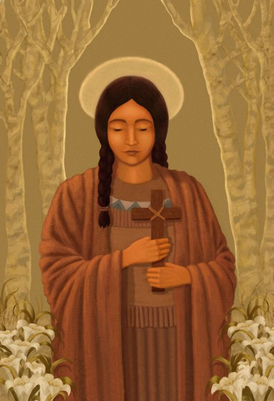
Lord God, you called the virgin, blessed Kateri Tekakwitha, to shine among the Indian people as an example of innocence of life. Through her intercession, may all peoples of every tribe, tongue, and nation, having been gathered into your Church, proclaim your greatness in one song of praise.
The National Shrine of Blessed Kateri Tekakwitha staffed by the Conventual Franciscans.
I would like to invite everyone to enter into a period of intense time of prayer for the Church in the coming days. Use your discretion as to length but do some form of prayer the good of the Church. The Holy See has asked five bishops to investigate the life of the members of the Legion of Christ beginning on July 15th. May I recommend the prayers to the Holy Spirit is needed as well as the Memorare for this intention.
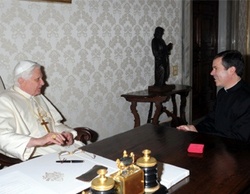
The Legion of Christ is not everyone's "cup of tea" but they certainly are an influence in many sectors of ecclesial life. The Legion has challenged the "categories" of many but they have done some good for the Church under the guidance of the Holy Spirit. So, while I am not a supporter of the LC, I am not looking for anything but an honest review and coherent application of mercy. What affects them ought to affect all of us since we are bonded together in Baptism making us all brothers and sisters. Am I my brother's keeper? Yes, and we ought to show prayerful solicitude with the Holy See and the bishops doing the investigating. Many peoples' lives are in significant turmoil over the recent revelations of misconduct of Father Marcial Macial (the founder) and other distressful matters of internal governance and the misuse of spiritual authority.
Today Sandro Magister published an interview with a prominent former Legionary priest, Father Thomas Berg. Consider reading it.
Here in the greater
Connecticut and New York area the Legion operates a novitiate, a juniorate, an institute of higher studies plus a variety of other initiatives, including
but not limited to the National Catholic Register and recent acquisition of Southern Catholic University. In the US the press reports that there are 24 Legion of
Christ houses with about 130 priests and more than 250 seminarians. It would be
inappropriate to suggest what the Pope would or should do for the good of the
Church and the Legionary congregation. Whatever it is that the members are
asked to do by the Church, I predict it will be some tough medicine and I ask that all of us stand on the side of the angels. This is an opportunity for excessive criticism and unflattering talk. It is time for prayer and conversion of life.

Since you have purified yourselves by obedience to the truth for sincere mutual love, love one another intensely from a pure heart. (1 Peter 1:22)
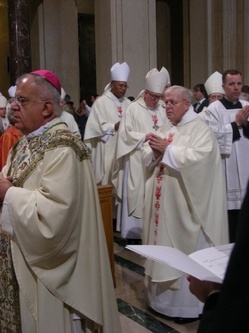
Today, a most beautiful DC day, with great joy and fanfare the Church ordained Father Joseph Augustine DiNoia, O.P., 66, a bishop. The setting was the beautiful Basilica of the National Shrine of the Immaculate Conception. The drama of the Liturgy couldn't come together in your theological imagination better than when you read the words in dome over the sanctuary which reads, in part: "Jesus has pored forth His Spirit you see and hear." Right, the Lord poured forth his Spirit upon Father Augustine ordaining him a bishop.
He was appointed by the Holy Father the titular archbishop of Oregon City. Even more to the point, he's the archbishop secretary of the Congregation for Divine Worship and the Discipline of the Sacraments; this office is part of the Roman Curia so Archbishop DiNoia works for the Pope.
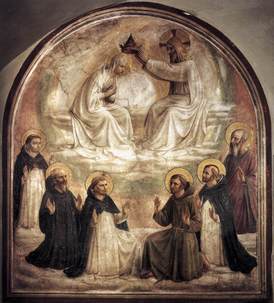
William Cardinal Levada was the consecrating prelate with the assistance of Archbishop Thomas Cajetan Kelly, OP and Archbishop Donald W. Wuerl. Antonio Cardinal Cañizares Llovera was supposed to be here but he forgot his passport at home and didn't have time to run back to the Vatican to get it and make the flight. Easily 250 priests and a handful of bishops including three other cardinals.
The image to the right is of Fra Angelico's Coronation of the Virgin (at the Convent of San Marco) was used for the invitation, worship aid and remembrance card. Talk about theology and Liturgy!
When the Papal Bull was read by the Dominican Provincial Father Dominic Izzo you heard the Pope say of DiNoia: you are a beloved son, suitable for the office of bishop because you manifest gifts of mind and heart, piety, diligence, experience and prudence; you are now asked by the Church to use these gifts for the up-building of the Church through the work of Liturgy and the sacraments.
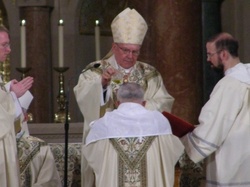
In the context of the Eucharist, family, friends, colleagues (past and present) and others who thought it best to attend, gathered to pray for the Spirit to come down upon Father Augustine so that he receive the gift of the fullness of Order, i.e., a bishop. We were reminded by Cardinal Levada that following ancient belief and practice the mission given to the apostles through Holy Spirit and imposition of hands the Tradition is preserved until today. The action of the Holy Spirit and the Church Father Augustine was conformed to the three-fold work of Christ as teacher, shepherd and priest not for himself but to join with Saint Peter and the apostles, Pope Benedict and the entire college of bishops in communion with the pope. Therefore, the doctrine is that a real "communio" exists with Augustine and the Pope and with every bishop in the world. So our Catholic belief here is that Father Augustine lives as Christ's vicar because of his episcopal character having particular care and solicitude for all the Church.
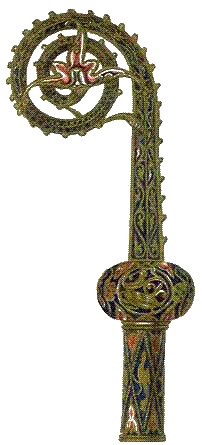
The notion of episcopal solicitude means that a bishop builds up the body of Christ not only at the local level but worldwide. How is this done? Going back to the point of calling on the Spirit to come down upon the person to be ordained and the anointing with oil. Delving deeper into this dramatic Liturgy we notice that the Church invokes the Trinity, the saints and angles to come upon Father Augustine who abandons himself to Christ in humility in an act of humility seen in his prostration before the altar. Moments later the cardinal imposed hands (with the other bishops) and poured oil on the head and gave the visible ornaments of the bishop's office (ring, mitre and crosier). Capping the ritual off was the seating of the bishop and the sign of peace. BUT, I think we need to reflect on the cardinal's words when said we are all to look to the "destiny of divine embrace" as all of heaven gazes down upon Augustine. Here we realize the promises of Christ. And to that, the saints and angels lift Augustine's gaze heavenward while the Trinity gives the grace to preach the gospel with constancy and faithfully.
Cardinal Levada reminded us of the tall order DiNoia was called to: to live and teach Gospel in truth. As a point in history he renews his commitment to the truth of Gospel. Remember: truth is not a thing but a Person. Truth, you will recall, makes us free for the service of Christ oriented toward the liberation of the world.
A nice point of continuity with Dominican history is that Archbishop DiNoia used the crosier of Father Benedict Edward Fenwick, OP, founder of the Dominican Province of Saint Joseph and bishop of Cincinnati. Other points of continuity were the presence of the archbishop's chaplains Dominican Fathers Gabriel B. O'Donnell (JAD's ordination classmate & my spiritual father) and Romanus Cessario. One can't overlook all of the Dominican family and friends who travelled long distances to support him.
Archbishop DiNoia's episcopal motto is In Oboedientia Veritatis. The explanation given comes from a papal homily:
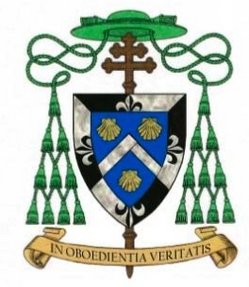
"A beautiful phrase from the First Letter of St. Peter springs to my mind. It is from verse 22 of the first chapter. The Latin goes like this: 'Castificantes animas nostras in oboedentia veritatis.' Obedience to truth must 'purify' our souls and thus guide us to upright speech and upright action. In other words, speaking in hope of being applauded, governed by what people want to hear out of obedience to the dictatorship of current opinion, is considered to be a sort of prostitution: of words and of the soul. The 'purity' to which the Apostle Peter is referring means not submitting to these standards, not seeking applause, but, rather, seeking obedience to the truth...This is the fundamental virtue for the theologian, this discipline of obedience to the truth; it makes us, although it may be hard, collaborators of the truth, mouthpieces of the truth. For it is not we who speak in today's river of words, but it is the truth which speaks in us, who are really purified and made chaste by obedience to the truth. So it is that we can truly be harbingers of the truth." (Pope Benedict XVI, Redemptoris Mater Chapel, Apostolic Palace)
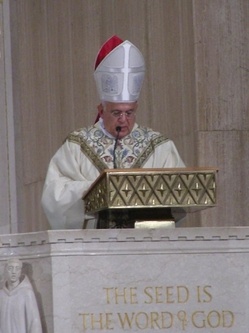
Finally, the whole ecclesial event was a wonderful grace for Archbishop DiNoia and in that my own friendships were renewed by seeing so many very friends, plus making new ones.
God our Father, You made Saint Benedict an outstanding guide
to teach men how to live in your service. Grant that be preferring your love to
everything else we may walk in the way of your commandments.
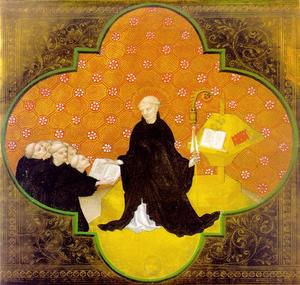
Famous for his work on the 12 degrees of humility, Saint Benedict proposes the following for those who want to advance in the spiritual life. The degrees of humility are given below.
The first degree of humility, then, is that a man always have the fear of God before his eyes (cf Ps 35[36]:2), shunning all forgetfulness and that he be ever mindful of all that God hath commanded, that he always consider in his mind how those who despise God will burn in hell for their sins, and that life everlasting is prepared for those who fear God. And whilst he guard himself evermore against sin and vices of thought, word, deed, and self-will, let him also hasten to cut off the desires of the flesh.
The second degree of humility is, when a man love not his
own will, nor is pleased to fulfill his own desires but by his deeds carried
out that word of the Lord which said: "I came not to do My own will but
the will of Him that sent Me" (Jn 6:38). It is likewise said:
"Self-will hath its punishment, but necessity win the crown."
The third degree of humility is, that for the love of God a
man subject himself to a Superior in all obedience, imitating the Lord, of whom
the Apostle said: "He became obedient unto death" (Phil 2:8).
The fourth degree of humility is, that, if hard and
distasteful things are commanded, nay, even though injuries are inflicted, he
accept them with patience and even temper, and not grow weary or give up, but
hold out, as the Scripture said: "He that shall persevere unto the end
shall be saved" (Mt 10:22). And again: "Let thy heart take courage,
and wait thou for the Lord" (Ps 26[27]:14).
The fifth degree of humility is, when one hides from his
Abbot none of the evil thoughts which rise in his heart or the evils committed
by him in secret, but humbly confesses them. Concerning this the Scripture
exhorts us, saying: "Reveal thy way to the Lord and trust in Him" (Ps
36[37]:5). And it said further: "Confess to the Lord, for He is good, for
His mercy endures forever" (Ps 105[106]:1; Ps 117[118]:1). And the Prophet
likewise said: "I have acknowledged my sin to Thee and my injustice I have
not concealed. I said I will confess against myself my injustice to the Lord;
and Thou hast forgiven the wickedness of my sins" (Ps 31[32]:5).
The sixth degree of humility is, when a monk is content with
the meanest and worst of everything, and in all that is enjoined him holds
himself as a bad and worthless workman, saying with the Prophet: "I am
brought to nothing and I knew it not; I am become as a beast before Thee, and I
am always with Thee" (Ps 72[73]:22-23).
The seventh degree of humility is, when, not only with his
tongue he declares, but also in his inmost soul believeth, that he is the
lowest and vilest of men, humbling himself and saying with the Prophet:
"But I am a worm and no man, the reproach of men and the outcast of the
people" (Ps 21[22]:7).
The eighth degree of humility is, when a monk doeth nothing
but what is sanctioned by the common rule of the monastery and the example of
his elders.
The ninth degree of humility is, when a monk withholds his
tongue from speaking, and keeping silence doth not speak until he is asked; for
the Scripture shows that "in a multitude of words there shall not want
sin" (Prov 10:19); and that "a man full of tongue is not established
in the earth" (Ps 139[140]:12).
The tenth degree of humility is, when a monk is not easily
moved and quick for laughter, for it is written: "The fool exalts his
voice in laughter" (Sir 21:23).
The eleventh degree of humility is, that, when a monk speaks,
he speak gently and without laughter, humbly and with gravity, with few and
sensible words, and that he be not loud of voice, as it is written: "The
wise man is known by the fewness of his words."
The twelfth degree of humility is, when a monk is not only
humble of heart, but always lets it appear also in his whole exterior to all
that see him; namely, at the Work of God, in the garden, on a journey, in the
field, or wherever he may be, sitting, walking, or standing, let him always have
his head bowed down, his eyes fixed on the ground, ever holding himself guilty
of his sins, thinking that he is already standing before the dread judgment
seat of God, and always saying to himself in his heart what the publican in the
Gospel said, with his eyes fixed on the ground: "Lord, I am a sinner and
not worthy to lift up mine eyes to heaven" (Lk 18:13); and again with the
Prophet: "I am bowed down and humbled exceedingly" (Ps 37[38]:7-9; Ps
118[119]:107)
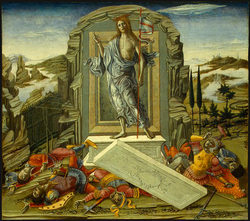
Father Paul Wattson, the founder with Mother Lurana White, of the Franciscan Friars and Sisters of the Atonement, gave hundreds of sermons, conducted numerous retreats, delivered many radio addresses and wrote extensively in four magazines: The Pulpit of the Cross, The Lamp, The Candle and The Antidote.
The following piece is Father Wattson's commentary on the feast of Our Lady of the Atonement. This Marian feast was approved by the Holy See in 1946 but it was first observed in July 1901.
The theological datum on atonement and therefore mercy, is near-and-dear to the heart of the Church and indeed to all Christians, so today's feast is apt. Let us pray for each other!
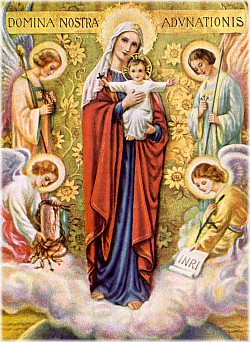
I am writing this letter on the day which we are accustomed to observe at Graymoor in special honor of Our Lady of the Atonement. This particular name of Our Blessed Mother is very dear to us and we believe it is dear to Our Lady herself. We hold it as among the most treasured and sacred traditions of our Institute that it was the Blessed Virgin who first taught us to call her by that name and there are cogent reasons why she should give this title a favorite place among the many by which she is invoked.
First among these reasons must be her own devotion to the mystery of the Atonement, for it was by the death of her son on the Cross, which cost him the last drop of his blood and made her preeminently the mother of sorrows, that the wall of division between God and man was broken down and both were made one (Ephesians 2:14), through Christ's atoning sacrifice.
As the Blessed Virgin is inseparably associated with our divine redeemer in the mystery of his incarnation, so is she closely associated with him in the great act of the atonement. Thus, is she always represented in the Gospel and in the liturgy and thought of the Catholic Church as standing by the cross, when Christ was crucified there.
There is a second reason, hardly less weighty than the first, why the title, Our Lady of the Atonement, should powerfully appeal to the mother of God. It was through the Incarnation she become the mother of Christ, but through the atonement she became the new Eve and the mother of all the regenerate, who being redeemed by the precious blood are predestined to eternal life as the adopted sons of God and heirs of the Kingdom of Heaven. The third time Our Lord spoke upon the cross it was to emphasize this phase of the Atonement, when he said to his mother: "Woman, behold your son," and to St. John, "Son, behold your mother." [John 19:26-27] Thus by virtue of the atonement Mary is the mother of all who live through Christ. Can anyone therefore possibly conceive the depth of significance this title "Our Lady of the Atonement" must possess for Our Blessed Mother herself?
But someone will ask, if so highly esteemed, why should it be kept hidden for nineteen hundred years, to be made known to the faithful in the twentieth century? Is it not the custom even of earthly mothers to preserve the choicest fruits in the summer time and hide them away under lock and key, to bring them forth to their children's delight in the depth of winter and did not the master of the wedding feast say to the bridegroom at Cana,
Every man at first brings forth good wine and when men have well drunk, then that which is worse. But you have kept the good wine until now. [John 2:10] |
"My ways are not your ways," [Isaiah 55:8] says the Lord of Hosts. (The Lamp, August 1919, pp.503-4) |
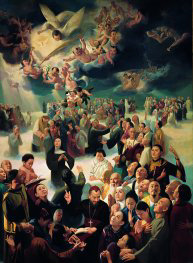
Father, we celebrate the memory of Saint Augustine Zhao Rong
and his companions who died for their faithful witnessing to Christ. Give us
the strength to follow their example, loyal and faithful to the end.
Saint Augustine Zhao Rong, a Chinese diocesan priest who was
martyred with 119 companions in 1815. Among their number was an
eighteen-year-old boy, Chi Zhuzi, who cried out to those who had just cut off
his right arm and were preparing to flay him alive: "Every piece of my
flesh, every drop of my blood will tell you that I am Christian."
"Caritas in veritate", said Benedict XVI,
"does not seek to offer technical solutions to the enormous social
problems of the modern world. ...What it does do is recall the fundamental
principles that are indispensable for building human development over coming
years". Among these principles it highlights "concern for the life of
man, seen as the centre of all true progress; respect for the right to
religious freedom; ... and the rejection of a Promethean vision of human beings
which sees them as the sole architects of their own destiny". (VNS)
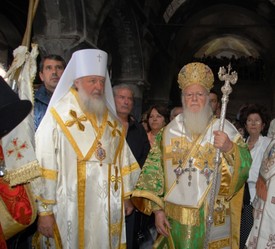 Wonderful news: Moscow's Patriarch Kyril visited Patriarch Bartholomew, the Ecumenical Patriarch of Constantinople. This is Kyril's first foreign trip since being elected Patriarch of Moscow in January 2009.
Wonderful news: Moscow's Patriarch Kyril visited Patriarch Bartholomew, the Ecumenical Patriarch of Constantinople. This is Kyril's first foreign trip since being elected Patriarch of Moscow in January 2009.Pope Benedict's 3rd encyclical, Caritas in Veritate, was published today. You may read it here. See the video clip about the pope's new work.
"In Christ, charity in truth becomes the Face of his Person, a vocation for us to love our brothers and sisters in the truth of his plan. Indeed, he himself is the Truth."
Today is also the 2nd anniversary of the publication of the Pope's Motu Proprio Summorum Pontificum.
The Daily Examen is a spiritual exercise on the events of the day looking to be aware of God's presence and discern His will for us. Various recommendations exist on utilizing this gift of prayer but I think it's necessary to do the Examen twice a day: at midday and then at the end of the day. The whole point of the Examen is to ask the three questions Saint Ignatius Loyola asked: What have I done, what am I doing and what will I do for Christ. This venerable spiritual practice of the Church helps us to see God's hand at work in our whole experience.
Saint Ignatius of Loyola gave us a five-step Daily Examen:
1. Be aware of God's presence;
2. Spend a moment looking over your day with gratitude for this day's gifts;
3. Ask God to send you His Holy Spirit to help you look at your actions, attitudes, motives with honesty and patience;
4. Review your day in a particular way;
5. Have heart-to-heart talk with Jesus.
Looking at these prayer points:
More than 400 years ago Saint Ignatius Loyola encouraged his disciples to cultivate a conscious awareness of the Divine Majesty's work in our lives. He wanted us to live vigorously in the power of the Blessed Trinity. Loyola called this awareness is what the Daily Examen.
1. Become aware of God's presence. So often we forget that God is really present in the daily work we engage in. Here you are asked to look back on the events of the day in the company of the Holy Spirit. The day may seem confusing to you --a blur, a muddle. Ask God to for the grace of clarity and understanding. Wherever you are, you are a creature in the midst of the beauty of creation. As you quiet yourself, become aware that God is present within you, in the creation that surrounds you, in your body, in those around you. Ask the Holy Spirit to let you look on all you see with love.
2. Be concrete and let the important moments of the day come to mind! In a general way give a moment of reflection on what happened to you. Some people will recall the smell of morning coffee, the laugh of a friend, the fragrance of a flower, or the feelings brought forth by a kind word, or what you've learned. Consider what you received and what you gave.
3. Give thanks to God for favors received. This is an opportunity to appreciate the permanent gifts you have that allow your participation in this day; conversely recall your particular strengths in times of difficulty. God the Father gives you these to draw you into the fullness of His life. As you move through the details of your day, give thanks to God for His presence in matters large and small. "When the Spirit of truth comes he will guide you into all truth." (John 16:13) The Holy Spirit inspires you with the gift of growing freedom in your life. Here the freedom the Holy Spirit offers to us allows us to look upon yourself without condemnation and without complacency and thus offering us the opportunity to change, to grow. Ask that you will learn and grow as you reflect, thus deepening your knowledge of self and your relationship with God.
4. Recall the events of your day; explore the specific context of your actions. Search for the internal movements of your heart and your interaction with what was before you. Ask the Lord to show you the moments of grace and sin based on what you experienced since the last time you did the Examen. In what ways did you accept the Spirit's gifts and in what ways did you resist the Holy Spirit? As the Psalmist says, we have a divided heart. The Examen shows us the areas of this division --the wavering of the heart between helping and disregarding, scoffing and encouraging, listening and ignoring, rebuking and forgiving, speaking and silence, neglecting and thanking. Remember, the Examen is not a time to dwell on your sin and other shortcomings; rather, it is a loving look with the Lord at how you have responded to God's gifts. The idea is to notice where you acted freely, that is, cooperated with grace--the picking a particular course of action from the possibilities you saw. See where you were swept along without freedom. What reactions helped or hindered you? See where Christ entered your decisions and where you might have paused to receive His influence. "Test yourselves," Sain Paul urges, "to see whether you are living in faith; examine yourselves. Perhaps you yourselves do not realize that Christ Jesus is in you." (2 Cor.) Thus, you will come to know that Jesus Christ is with you. Christ continually invites you to love Him and your neighbor as yourself; He will strengthen you to do this.
5. Seek God's guidance. Ask Him for help and understanding. Pray for hope. Speak with Jesus about your day, about your concerns. Share your thoughts on your actions, attitudes, feelings and interactions. You may feel the need to seek forgiveness, to ask for direction, to share a concern, to express gratitude, etc. Express sorrow for sin; give thanks for grace, the enlightening presence of God, and especially praise God for the times you responded in ways that allowed you to better see God's life. Resolve with Jesus to move forward in grace-filled action.
You might like to finish your time with the Lord's Prayer and the Glory be.
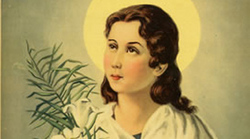 Father, source of innocence and lover of chastity, you
gave Saint Maria Goretti the privilege of offering her life in witness to
Christ. As you gave her the crown of martyrdom, let her prayers keep us faithful
to your teaching.
Father, source of innocence and lover of chastity, you
gave Saint Maria Goretti the privilege of offering her life in witness to
Christ. As you gave her the crown of martyrdom, let her prayers keep us faithful
to your teaching.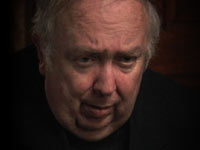 When I first met Msgr. Giussani 16 years ago, I had no
idea what we would talk about. I flew up from Rome to Milan to have lunch with
"Don Gius" and a mutual friend who had arranged the meeting. I thought our
friend would guide the conversation, but the day before the meeting I learned
that he would not be there. It would just be a lunch meeting between Giussani
and myself. On the flight to Milan, I browsed through a book by Giussani that I
had picked up in order to have it autographed (L'Avvenimento Cristiano, The
Christian Event), and because our friend had told me it would help me understand
what Giussani was all about.
When I first met Msgr. Giussani 16 years ago, I had no
idea what we would talk about. I flew up from Rome to Milan to have lunch with
"Don Gius" and a mutual friend who had arranged the meeting. I thought our
friend would guide the conversation, but the day before the meeting I learned
that he would not be there. It would just be a lunch meeting between Giussani
and myself. On the flight to Milan, I browsed through a book by Giussani that I
had picked up in order to have it autographed (L'Avvenimento Cristiano, The
Christian Event), and because our friend had told me it would help me understand
what Giussani was all about.OK, I laughed (to myself so as not to disturb the priests with whom I live) that Patriarch Kirill of Moscow and All Russia said in May to a youth conference that he thinks women are the stronger sex and psychologically more sturdy than men. My mother and sister would agree; and if my grandmothers and Aunt Jeanne were alive, they'd agree with His All Holiness. I am happy that he said this because he confirmed something I always knew or was drilled into my noggin --and heard proclaimed by women's organizations since I've been in seminary formation. While this is neither new news nor as the critical as the oxygen being sucked out of the news industry in the past 8 days (with Michael Jackson's death) but now it's "infallible" and we all know the truth. Really, I am not poking fun at the Russian Patriarch...I think it's humorous that such a point was newsworthy of Interfax, a news agency. In part, Patriarch Kirill said:

"Men happen to be frailer. The upheavals of 1990s caused many of them to break down, but women had more vigor to endure the stress."
Answering questions, it was said that sport achievements required courage: "women win our country most of Russia's gold medals in sport."
The Patriarch's words received a riveting ovation. "An individual comprises both spirit and body, and human strength depends not only on its physical component. In this regard, women are the stronger sex," Patriarch Kirill said.
That he travels around Russia Patriarch Kirill noticed that "Almost every village has some kind of an amateur talent group. Who sings in a choir? Women do, and sometimes they are accompanied by a drunken accordionist." The same is true for many village schools, libraries, post offices, local administration where women have to play the lead, concluded Kirill.
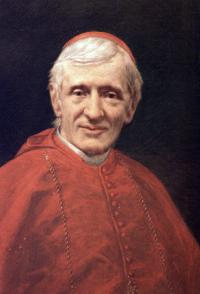 The Holy Father recognized the 2001 healing of Deacon Jack Sullivan as a miracle by way of the Venerable Servant of God Cardinal John Henry Newman's intercession. This was the final step in the beatification process of the English cardinal; of course, the canonization process will continue to its natural end. Now the details of the beatification ceremony are pending which is likely to be England.
The Holy Father recognized the 2001 healing of Deacon Jack Sullivan as a miracle by way of the Venerable Servant of God Cardinal John Henry Newman's intercession. This was the final step in the beatification process of the English cardinal; of course, the canonization process will continue to its natural end. Now the details of the beatification ceremony are pending which is likely to be England.My friends at St Louis Abbey posted this cheat-cheat on doing lectio divina encouraging us to dig deeply into this very necessary form of prayer. All good things are derived from the daily practice of lectio divina. As the monks will tell you, lectio is not only for monks but for the entire Church.

Lectio divina is a way of getting in touch daily in a personal way
with the Father, the Son and the Holy Spirit; it is a way of getting in touch
with Jesus Christ our Lord and our brother. It is away of reading centered on
God and, if you do it with faith you will be able to hear what he has to say to
you here at this moment. It is a
way of reading which is slow so that the words are savored in meditation. It moves
from the literal meaning to what only the Spirit can make clear to you. It
calls for action by your involvement and for passive surrender as it draws you
into the heart of God. It is disinterested; the text must be read for its own
sake and not for the achievement of having read it.
Lectio is a way of experiencing Jesus Christ. You will encounter him personally in the sacred scriptures because he is there hidden in the pages of your Bible and you ought to believe in his presence with greater assurance than if you could see him with your eyes. He has the same power there as he revealed in the gospels and he cures you of your physical and moral ailments, brings his light to your everyday life and leads you to eternal life.
Your encounter is with the Word who loves you unconditionally and is ever present and real in your life. From all eternity God has had a plan for the whole course of your life, your personal fulfillment, your vocation, your happiness. You will surely stray from the right path and become alienated from your true self through serving other gods, if you do not allow him to reveal himself to you daily through his word. It is in your Bible that the true story of your life is written. If you don't at once understand what you read, then have confidence that the Lord will reveal it to you in his own time, because no word comes form the mouth of the Lord without achieving in you the work he intended. If your thoughts and imagination get in the way of your prayer, then fling them immediately before Christ. Make no attempt to master them by your own strength, but try to turn back to your prayer.
You ought to do lectio every day, even if it is only one single verse of the Bible, because, "It is not on bread alone that man lives but on every word that comes from the mouth of God." (Matthew 4:4) Your reading of the word of God should be deliberate, moving slowly from verse to verse, from word to word, watching for the context, paying close attention to each passage, looking out for the answers that are there in sacred scripture itself and the echoes they evoke, watching the notes and marginal references and always treasuring silence so as to make space to listen. You should know that the word you hear is directed to you personally and individually. When you read the word of God, it speaks to you; when you pray, you speak to the word and so turn your prayer into conversation.
Your prayer may be simply staying with the word in silence, or it may be a thanksgiving, or a petition, or praise, or blessing, or contrition, or intercession, or one single word on which you pause and then repeat at will, or it may be a prayer of inspiration. If you are taking part in shared lectio, the way to share what the scripture has said to you is by means of a personal comment spoken in the first person singular and applied to your own life, or else it may be a prayer out loud offered directly to God.
By José Manuel Eguiguren Guzman of the Manquehue Movement, Chile; translated by Abbot Patrick Barry, O.S.B.
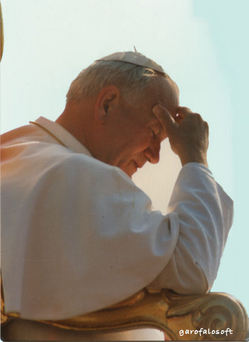 Yesterday morning [June 30] there was help at the Congregation
for Causes of Saints the second meeting of the theological consultors tasked to
examine the "Positio," that is the documents and testimonies of the
cause for beatification of John Paul II. In the first meeting, about
which Il Giornale has spoken, was held on 13 May. But it had an
intermediate (or interlocutory... "interlocutorio") outcome, because of
critical point raised not about the personal sanctity of Pope Wojtyla but about
the manner in which the work was advanced and the lack of documentation.
The postulator of the cause, Msgr. Slawomir Oder, responded in writing to the
objections and yesterday there was held the second and final meeting of the
theologians, which had given a favorable majority opinion. Two of them
maintained the initial "suspended judgment" ("sospensivo")
because they though that the proofs and documents ought to have been integrated
("il quadro probatorio e documentale debba essere integrato"). This is the article that was published in today's Il Giornale. Now the
"Positio" goes to the cardinal and bishop members of the
Congregation, who before the end of the year will make a decision about the
heroic virtue of Pope Wojtyla. Then it will fall to Pope Benedict to
promulgate the decree which will bring his predecessor to beatification.
Yesterday morning [June 30] there was help at the Congregation
for Causes of Saints the second meeting of the theological consultors tasked to
examine the "Positio," that is the documents and testimonies of the
cause for beatification of John Paul II. In the first meeting, about
which Il Giornale has spoken, was held on 13 May. But it had an
intermediate (or interlocutory... "interlocutorio") outcome, because of
critical point raised not about the personal sanctity of Pope Wojtyla but about
the manner in which the work was advanced and the lack of documentation.
The postulator of the cause, Msgr. Slawomir Oder, responded in writing to the
objections and yesterday there was held the second and final meeting of the
theologians, which had given a favorable majority opinion. Two of them
maintained the initial "suspended judgment" ("sospensivo")
because they though that the proofs and documents ought to have been integrated
("il quadro probatorio e documentale debba essere integrato"). This is the article that was published in today's Il Giornale. Now the
"Positio" goes to the cardinal and bishop members of the
Congregation, who before the end of the year will make a decision about the
heroic virtue of Pope Wojtyla. Then it will fall to Pope Benedict to
promulgate the decree which will bring his predecessor to beatification.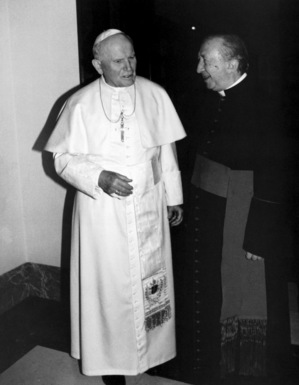
On 31 March 197 Pope John Paul II said of Communion and Liberation: "I like this name very much." Here's his explanation:
So you too, young people, beloved young people, have shown, in the very name chosen to describe your movement "Communion and Liberation" (I must say that I like this name very much, I like it for many reasons: for a theological reason and for, I would say, an ecclesiological reason. This name is so closely linked with the ecclesiology of Vatican II. Then I like it because of the perspective it opens to us: the personal, interior perspective and the social perspective: Communion and Liberation. For its topicality, this is the task of the Church today: a task which is expressed precisely in the name "Communion and Liberation." With this name, therefore, you have shown that you are well aware of the deepest expectations of modern man.
The liberation to which the world aspires--you have reasoned--is Christ; Christ lives in the Church; man's true liberation takes place, therefore, in experience of ecclesial communion; to build up this communion is, therefore, the essential contribution that Christians can make to the liberation of all.
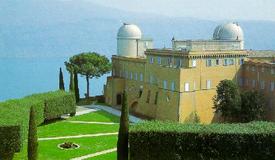
The Jesuit report that after residing
more than seventy years within the papal summer Palace itself, the headquarters of the Vatican Observatory recently moved to a new
location in the Papal Gardens at Castelgandolfo. The move was occasioned by
increased demands for space within the Palace, and the growing needs of the
Observatory. Until few weeks ago, the observatory offices were located on the
top floor of Papal Palace, the Pope's summer home located in the Alban Hills,
25 kilometers southeast of Rome. Its extensive astronomical library is
scattered over four rooms on the top two floors of the Palace, while the
valuable meteorite collection and laboratory, the historic vault of
photographic observations made at the Observatory from 1895 to 1979, and the
classroom where the biennial Vatican Observatory Summer Schools are conducted,
are located on the ground floor of the Palace. Meanwhile, the living
quarters of the Jesuits is divided between rooms on the second and top floors.
With the prospect of half a dozen younger Jesuits joining the staff over the
next five years, the issue of both residence and office space was becoming
acute.
"Moving the Observatory collections and libraries has been
a logistical challenge," noted Father José Funes, the Argentinean
Jesuit and director of the observatory. "But the new site will allow us to
address a growing need for space and order." The new quarters,
located in the remodelled monastery built by the Basilian monks within one of
the most beautiful gardens in the Italian peninsula, should provide a far more
peaceful and comfortable setting. The Vatican Observatory traces its
history to the reform of the calendar by Pope Gregory XIII in 1583. It was
re-organized by Pope Leo XIII in 1891, "so that everyone might see clearly
that the Church and her Pastors are not opposed to true and solid science,
whether human or divine, but that they embrace it, encourage it, and promote it
with the fullest possible devotion."
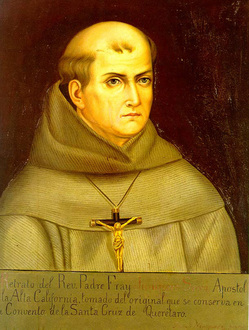 My words that I have put in your mouth, says the Lord, will never be absent from your lips, and your gifts will be accepted on my altar.
My words that I have put in your mouth, says the Lord, will never be absent from your lips, and your gifts will be accepted on my altar.
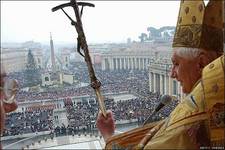
The general intention
That Christians in the Middle East may live their faith in complete freedom and become instruments of reconciliation and peace.
The missionary intention
Through the witness of the faithful, may the Church be the seed and soil of a humanity reconciled to be God's one true family on earth.


